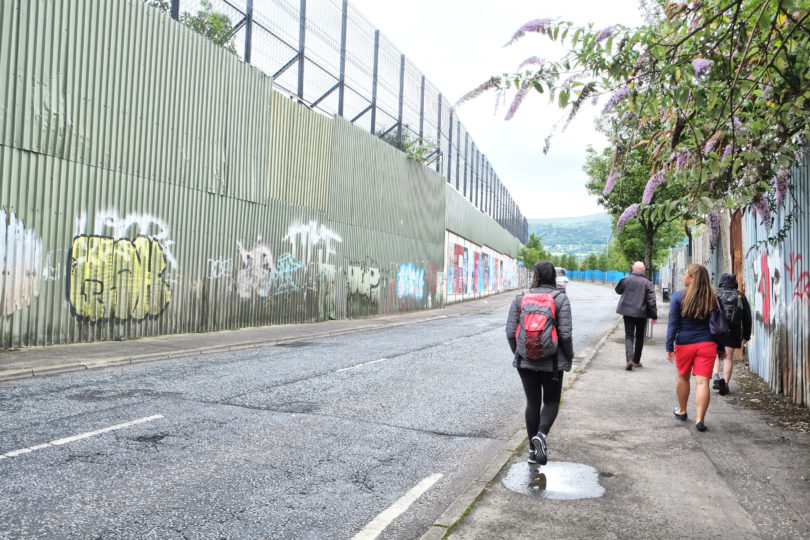
The Northern Ireland Troubles Legacy Act 2023 has ignited a legal battle, with Ireland challenging the UK at the European Court of Human Rights.
Diane Duggan BL explores the Act’s controversial proposals and potential repercussions on Anglo-Irish relations and the complex aftermath of the Troubles.
The Troubles Legacy Act
How post conflict societies deal with legacy issues is one of the most complex questions that emerges in the aftermath of violence. Ireland is no different, and the most robust attempt yet by the British government to draw a line under the Troubles has now resulted in Ireland taking the United Kingdom to the European Court of Human Rights (ECtHR) for only the second time in over five decades. The move could impact years of carefully managed diplomacy at a time when the relationship between the two governments has plummeted. It is intended to examine briefly what is at stake and what such a case might involve.
Dealing with the Troubles’ Legacy To Date
Despite multilateral agreements since the Good Friday Agreement in 1998, addressing unlawful killings during the Troubles remains unresolved. A fragmented approach through inquests, police ombudsman investigations, civil actions and police investigations has been growing in recent decades and has gradually become more effective. These were underpinned by the introduction of the European Convention on Human Rights into UK law in 1998, as agreed under the Good Friday Agreement. This ensured thorough and transparent determinations to emerge in such matters as the 2021 Ballymurphy inquest, where the British Army had shot 11 victims, claiming they were IRA activists, and their killings were found to be unlawful. This is what is at stake in legacy issues; how to tell the truth about history at its most serious level. On 18th September 2023, the Northern Ireland Troubles (Legacy and Reconciliation) Act 2023 (‘the Legacy Act’) was passed in Westminster despite opposition from all of the political parties in Northern Ireland. The Irish government had urged the UK government that the Act was a serious deviation from most recently agreed approaches in the Stormont House Agreement 2014 and a breach of the ECHR. The decision by the UK to legislate in such a way was an entirely unilateral one; in contrast to decades of previous collective consultative action by all parties to the GFA since 1998.

What Have Other Jurisdictions Done?
Other post conflict societies have dealt with legacy issues in different ways. The approaches can range from the restorative approach of South Africa’s ‘Truth and Reconciliation Commission’ to the retributive method implemented by the Nuremberg trials, or, an agreement to simply ignore the legacy of violence seen in post Franco Spain’s ‘Pact of Forgetting’. Indeed on this island, the Free State passed the Indemnity Acts 1923 and 1924, which granted amnesties for anti-treaty activists and British forces, along with the national army. 100 years later, the Legacy Act proposes to implement similar measures of indemnity and immunity through the establishment of the Independent Commission for Reconciliation and Information Recovery (ICRIR), although 21st century standards of justice and human rights may yet prove to be its greatest adversary.
What Does the Act Propose To Do?
The Act proposes to establish a process through the ICRIR that would deal with all Troubles related cases. It defines the Troubles as a period commencing on 1st January 1966 and ending on 10th April 1998. Functions of the ICRIR will include reviews of deaths and other ‘harmful conduct’ during the Troubles, and determinations regarding the granting of immunity to certain persons. It will also bring an end to any further inquests or civil actions related to the Troubles.
Critics of the Act include the Council of Europe Commissioner for Human Rights, UN Commissioner for Human Rights, all political parties in Northern Ireland, the Oireachtas Committee on the Implementation of the GFA, Amnesty International and the Northern Ireland Human Rights Commission. The foremost complaint is that the Act breaches Article 2 (right to life) of the ECHR by its immunity provisions, where victims’ families have an entitlement due to process that ensures perpetrators can be brought to justice. It is alleged that the Act is in breach of the GFA in that it will limit the ability of people in Northern Ireland to potentially challenge breaches of the ECHR. Furthermore, it is argued that the Act interferes with policing and justice issues which are devolved powers under the GFA, without seeking consent of the legislature to do so. The Northern Ireland Human Rights Commission (NIHRC) has distinguished the South African legacy regime from this Act stating that the Truth and Reconciliation Commission was established following consultation with civil society for one year. It then formed part of a broader reconciliation process and hearings were held in public. In contrast, this Act provides the ICRIR with powers to withhold evidence and information from families seeking justice. No such consultative process was carried out prior to its introduction. Where ECHR rights are at stake, procedural aspects are vital. Investigations must be thorough, impartial and independent.
What is Ireland’s Position and What is an Interstate Case?
Under the ECHR, cases are taken against states either by individuals (Article 34) or by other states (Article 33). Since 1953, there have only been approximately 30 interstate cases taken to the ECtHR, and the Court has received over one million individual applications since its inception. Ireland took its first interstate case against the UK in 1971 in relation to the actions of the British forces at the outset of the Troubles. The Court ultimately held in 1978 that Article 3 violations occurred; regarding inhuman and degrading treatment but not torture.
Families of victims killed in the Troubles are currently at the initial stages of a judicial review of the legislation in Belfast. It was expected that this judicial review may ultimately end up in Strasbourg, but would be a slower process as the families must fulfil the requirement of exhausting domestic remedies first (Article 35). Thus, their challenge had to begin by asserting a breach of ECHR rights in the UK courts, which commenced in November 2023, and it is likely that this could ultimately go to the UK Supreme Court, requiring substantial time. If they were unhappy with the outcome, it is only then that they could proceed to take a case to Strasbourg.
What are the Potential Complexities?
There are some complications that may arise for Ireland, but overall, Ireland has a very strong case on the merits. There are different approaches to legacy issues, but regardless of one’s view, this Legacy Act appears to have major problems that will be difficult for the UK to overcome and show compatibility with the ECHR. The jurisprudence of the court is very consistent and a declaration of incompatibility is likely. A bigger problem potentially arises however, even if Ireland wins, will the UK comply?
If both Ireland and individual cases were to be successful in Strasbourg, it is possible in the current political climate in the UK that the result could simply be ignored. Even if the UK government does comply with any outcome, it is clear that the ECHR has become something of a lightning rod in the UK, where there is bound to be a polarised reaction from some. This could become a real test for the rule of law generally in the UK and with such high stakes, it could have a conscious or unconscious effect on the jurisprudence of the ECHR.
In announcing their decision to take a case, the Irish government said they felt there was no other option having exhausted all political options which failed to elicit successful engagement on legacy issues. It is certainly a change of political climate since 1998. This case will undoubtedly be long and could come to determine the tone of Anglo Irish relations in the years to come. Despite the politics, this case will be determined on its legal merits.
President Síofra O’Leary of the ECtHR said in a speech earlier this year “As a court of law we are charged with interpreting and applying the law of the Convention whilst often navigating very choppy political waters…politics are never far from our courtroom, but politics is not what we do”. Perhaps it is fitting that the issue of the legacy of the Troubles will now be determined by law in a Court that emerged from the aftermath of Europe’s greatest wars.
Perhaps it is fitting that the issue of the legacy of the Troubles will now be determined by law in a Court that emerged from the aftermath of Europe’s greatest wars.
This article is an abridged version. Click here for the complete, unabridged article published by ARINS, the Royal Irish Academy blog.
The views expressed above are the author’s own and do not reflect the views of The Bar of Ireland.